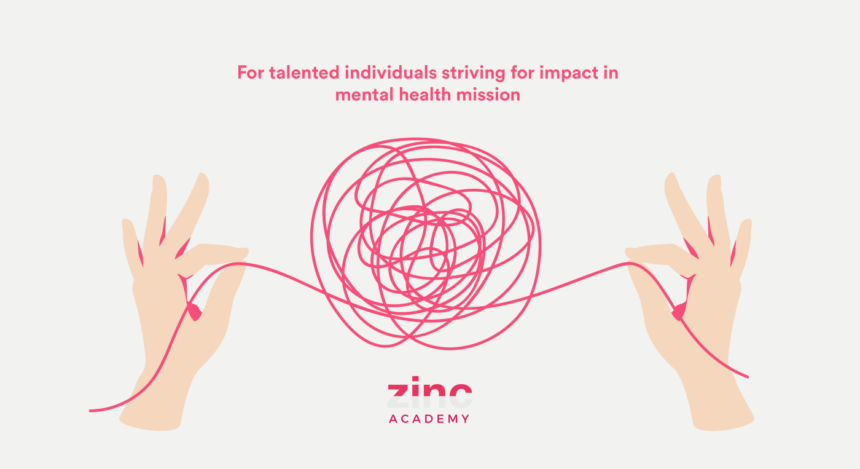COVID-19, Mental Health and the Zinc Academy

COVID-19 is a three-pronged crisis: along with the obvious implications for physical health, and the economic consequences, comes the complex question of how to address society’s mental health during, and after, the pandemic passes. Here the Zinc Academy Director, Eleanor Ford, talks about Covid-19, mental health and preparing for recovery.
At the beginning of April, Zinc was due to launch its first Mental Health Academy, a programme which would bring together passionate individuals from diverse backgrounds who want to increase their impact in mental health. The 9-month part-time programme, with three intense weekend sessions, was designed with an emphasis on community and cohort. We would bring together a talented group of people that were not only motivated by the challenge of tackling one of society’s thorniest problems, but who also wanted to join a community of people driven by the mental health mission — to support, to inspire, and to hold them to account.
As we entered into The Times of Covid, it became increasingly clear that bringing a diverse group together in one room over three days in April would be an impossibility and the most viable solution was to postpone to a September start, whilst we planned out our digital response. Thankfully, the people who had already enrolled in the programme remained patient and committed, accepting the reality of unprecedented times. The expert speakers lined up for the delivery were put on hold, and the final programming was frozen.
But, most importantly, applications for the Zinc Academy were re-opened.
Indeed, as some things stall during this pandemic, others gain new energy and urgency. We are now preparing for an entirely new context, one which makes it not only important to consider the ‘normal’ we want to return to — in which we may wish to redirect and redetermine our life course — but also one in which a focus on the nation’s mental health is more relevant than ever.
The pandemic is having major economic, social, and psychological impact on the whole population
As we go about creating agile certainties in uncertain times, one thing appears evident: the mental health narrative is now reaching a new platform in the public domain. Newly conducted polls and emerging studies into Covid-19, as well as evidence from past outbreaks, suggest that the pandemic will have potentially long-term implications for the nation’s mental health. Professor Ed Bullmore, Head of Psychiatry at the University of Cambridge and co-author of a new report says: “Our key message is that Covid is likely to have major impacts on Mental Health now and into the future” and underlines the fact that we need to start thinking about this immediately. We need to think about physical and mental health in the same frame and recognise this is a mental health crisis too.
So, what will this mean?
We will certainly see an increase in demand for existing services, and these will most likely be even harder to access. Moreover, as we consider the profound consequences of a pandemic and go from the “sustained phase” to the “recovery phase” of the Covid Curve, we need to think about what services and support need to look like at the local and national level.
It has also been suggested that the pandemic is creating a “normalising” of the realities of mental ill-health — a language, a recognition, an acceptance of this crucial aspect of human health. With the effects of social isolation and loss of routine and livelihoods felt more widely than ever before, and the emotional content of our lived experience made more visible, the hope is that mental health stands a greater chance of being prioritised. Could this increase our shared understanding of what it means to suffer?
As one of the brilliant Academy candidates with lived experience says:
“There is lots of advice around right now about surviving quarantine that apply to people with mental health difficulties everyday — namely ride the waves of your emotions, don’t put too much pressure on yourself and just get through it. The advice is to be aware that you may get teary, restless, overwhelmed, struggle to sleep, struggle to make decisions or just want to stay in bed. These are day to day common experiences for people with mental health difficulties. I’ve never had so many conversations with friends that are referring to having ‘good days and bad days’- this changeability is natural for me. In a way I am finding some comfort in it. I am comforted that collectively we are talking about managing the fluctuations of mood- people are finding out what 100 moods in one day feels like”
There is a national rhetoric at the moment of this being a communal, bonding, levelling experience. But is it?
We may be in this together, but how are we going to come out?
The reality is that we will emerge with the same inequalities with which we went in, but with those inequalities heightened. As a report from NESTA outlines, the negative effects of the crisis will be concentrated among those most at risk and with lower resources. Eight key groups are likely to experience the effects of the pandemic more intensely : Children, young people and families (school closures, domestic violence, no free school meals); Older adults and those with underlying health conditions (isolation, loneliness, bereavement); People with existing mental health issues (relapse and disruption to services); Frontline healthcare workers; People with learning difficulties (changes to routine and support); People on low incomes (job and financial insecurity); Prisoners, the homeless and refugees (social exclusion); and then Society in general, who are likely to experience increased health and economic inequality. For groups such as these, there are often clear systemic causes for their suffering — they need mental health support, but they also need money, social safety nets, job security and protection from violence.
Mirroring society in general, Covid-19 is a deeply unequal experience, and in that way it exposes, as well as it deepens, social divides.
Zinc’s Mental Health Lead, Dr Iain Jordan, a Clinical Psychiatrist, says:
“A theme is emerging, which is the scapegoating of ‘Mental Health Issues’ when the urgent problems are underlying structural, social, and economic ones. I see this in healthcare (where I have been involved in setting up MH support for frontline workers) but also in the broader population”
That’s why we need a group of motivated individuals who want to create change in existing structures, as well as build new systems and solutions. And our contribution to that is the Zinc Academy.
We need to focus systemically in our response to the mental health landscape, and do that by bringing together different approaches, schools of thought, and experience. This approach is reflected in the structure of the Academy curriculum. It is designed to examine health through the lens of life stages and social determinants — such as family settings, poverty and homelessness. No conversation about mental health can be complete without a consideration of how trauma, economic inequality, social exclusion, and gender inequality, amongst other things, lead to poorer health outcomes. Working with mental health clinicians, campaigners, neuroscientists, social workers, those with lived experience, and myriad other groups, we believe everyone brings something different to this vital discussion. As Dr Iain Jordan says:
“We need to train participants to think clearly and honestly about what intervention is needed in each particular context. This might mean advocating for and effecting social change, it might mean enhancing or transforming existing services, and it might mean deploying therapy and educational and psychological skills at scale. It will depend upon the intended recipients and nature of the problem”.
What Covid-19 has shown us is that we are part of one inter-dependent system (very quickly so-called ‘low-skilled’ workers became re-labelled essential workers) and that each person’s ability to survive and thrive depends — in the long run — on the resilience of the whole society.
And, as such, we will need a broad and varied set of responses, as Gregor Henderson, Director of Mental Health at Public Health England and Zinc Strategy Advisor points out:
“I do think that when we emerge from this, the economic realities and downturns will be the things that determine our mental health most. So more than ever we will need social large scale answers to these challenges, no amount of extra mental health care (however desirable) will be able to respond to this on its own”.
This is why we have recruited individuals to The Academy from across society, to create new, varied and adaptive responses. This includes mental health nurses and doctors, educators, charities professionals, and psychotherapists working in deprived areas, as well as entrepreneurs, financial professionals, and consultants — all looking for transformative ways to push at the edges of systems to make that change. And the Academy aims to help get those people off the starting blocks as they re-imagine the ways in which we can improve the health of the population, beyond the constraints of what exists now. We will be showcasing those people over the coming weeks.
But crucially, the delay due to Covid-19 has allowed us to build this group further. We are open to new applications from passionate and motivated individuals who want to rethink their impact in the world, to be supported and empowered to understand mental health and ill-health in a broader and deeper way, and to know how and when to take action.
The moon-shot goal of the Zinc Mental Health Academy is to use the extensive body of knowledge of things that do work to prevent and alleviate mental ill-health, to empower people to implement and scale these solutions in their institutions, their workplaces, communities and wider society, and to identify and scale novel solutions.
We need people from every walk of life to help us achieve this. Now more than ever. Get in touch below if you want to join us on this mission.
___________________________
The Zinc Academy will accelerate the impact of those individuals who want to contribute other system-level solutions. It’s a place for changemakers who are passionate about making progress on complex problems. The first Academy programme starts in September 2020.
Please contact academy@zinc.vc if you would like to find out more and join us at our next Meet & Greet on Thursday 14 May at 1pm
Join the Zinc community
Stay up to date with all Zinc updates and future posts as part of our fast growing community.
Featured Resources
Impact Report 2023
We started Zinc with the hypothesis that missions are an effective way to attract highly ambitious, talented and experienced groups of innovators, who might not recognise themselves as “classic entrepreneurs” but are ready and able to start a new commercial and successful venture to tackle some of our most pressing societal issues.
The world has overcome the sorts of challenges we face today when it has adopted a mission-based approach to the biggest problems and brought together world-class talent to invent and innovate, e.g: NASA and landing a man on the moon, the LSE blueprinting the British welfare state, or the Gates Foundation aiming to eradicate diseases.
On this basis and assumption, we designed Zinc as a new mission-based Venture Builder — a place where global talent, ‘impact makers’, can join to experiment and develop new solutions to our most pressing societal issues.
To Eliminate Environmental Threats to Our Health
Environmental health threats pose a grave danger to human health and well-being, causing suffering to individuals and communities worldwide. These threats, which include chemical pollution, climate change, and biological hazards, cause acute and chronic diseases and exacerbate existing health conditions.
To protect those we care about, we must tackle the causes of environmental degradation, shield people from the consequences of environmental harm, and, where protection fails, we must mitigate the health impacts they suffer.
This demands action to improve all aspects of our environment: soil, food, air, water, and the built environment. It requires us to focus on every aspect of human health to reduce suffering.
Entrepreneurship and technology are powerful means to tackle these challenges. That’s why we are backing 70 founders to build innovative companies addressing this mission.


